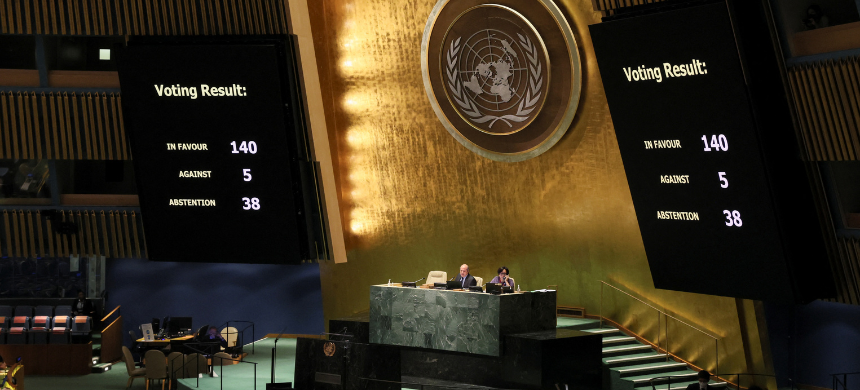The United States sided with Russia in two separate UN votes, a move that has deepened divisions with its European allies as it marks the third anniversary of Russia’s full-scale invasion of Ukraine.
At the UN General Assembly in New York, a European-drafted resolution condemning Russia’s aggression and affirming Ukraine’s territorial integrity was passed with 93 votes in favor. However, the US, along with Russia and 16 other countries, voted against it, while 65 nations abstained. Ukrainian Deputy Foreign Minister Mariana Betsa stressed the importance of global unity in condemning aggression, warning that such actions should not be rewarded.
In a second instance at the UN Security Council, the US introduced its own resolution calling for an end to the war, notably omitting any direct criticism of Russia. This resolution passed with 10 votes, but key US allies like the United Kingdom and France, along with Denmark, Greece, and Slovenia, abstained after their proposed amendments were vetoed, reflecting growing discomfort within the Western bloc over the US’s evolving stance.
These votes come at a time when relations between the Trump administration and European allies are strained. Under President Donald Trump, the US has shifted its approach to Ukraine, with critics accusing the administration of prioritizing closer ties with Moscow over traditional alliances. The divide was further highlighted by recent diplomatic moves, with French President Emmanuel Macron visiting Washington to ease tensions and British Prime Minister Sir Keir Starmer set to meet President Trump. The Trump administration has repeatedly questioned America’s long-term role in European security, and these recent UN actions have only amplified concerns in European capitals.
Read More: European Nations Recognizing Palestine Isolates Israel Further
Following the Security Council vote, acting US envoy to the UN, Dorothy Camille Shea, defended the resolution as a “simple historic statement” focused solely on ending the war, rather than dwelling on past grievances. Nevertheless, European diplomats have voiced serious concerns over the US breaking ranks with its closest allies. A senior European official remarked that it was unprecedented for the US to be so at odds with its partners.
Since Russia launched its full-scale invasion of Ukraine three years ago, the UN Security Council has largely been deadlocked due to Russia’s veto power, making the UN General Assembly the primary forum for discussing the conflict, albeit with non-binding resolutions.
Analysts warn that the US’s latest actions could further erode trust among European allies, particularly as the war in Ukraine continues without a clear resolution. The Trump administration’s reluctance to confront Moscow directly stands in stark contrast to previous policies that aimed to isolate Russia through sanctions and robust military aid to Kyiv. For Ukraine, this shift in US policy is particularly troubling; while military support continues, the political messaging at the UN signals a departure from the unified Western approach of the past.
“This is not merely a procedural vote; it’s a test of where the US stands on global security,” a European diplomat commented, noting the serious implications for Ukraine, NATO, and Europe as a whole.











